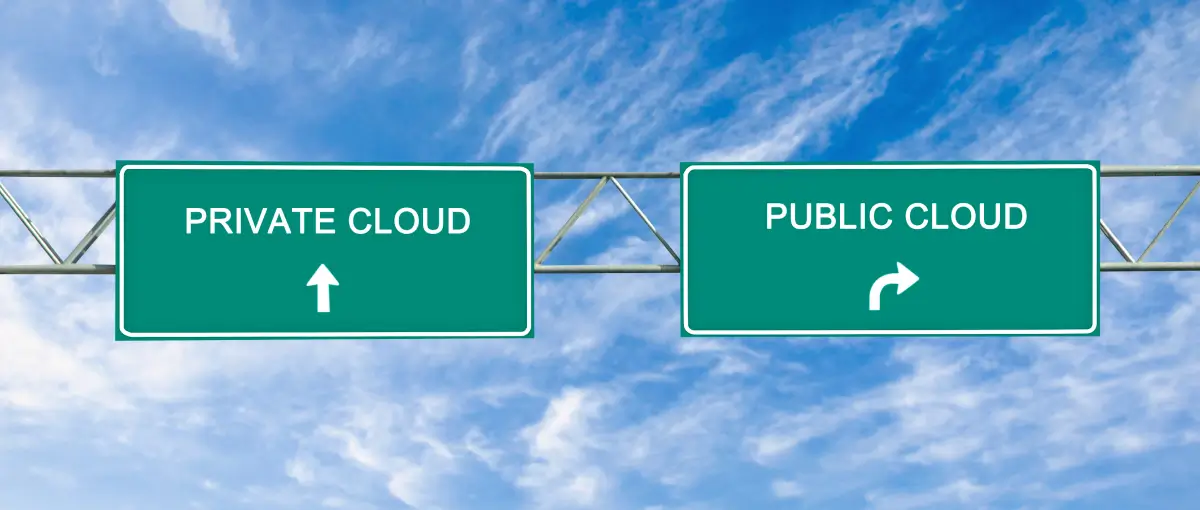Deciding between public and private cloud is neither a small decision nor an easy one. It could have significant ramifications for your business, including costs, risks, and (my favorite subject) how you would back it up and recover it in case of disaster. This article is my best attempt to lay out the pros and cons of both approaches, then focus on matters of backup and recovery. First, let's define the difference between public and private cloud.

Public and Private Cloud Definitions
Public Cloud
The public cloud is a computing model where computing services are provided to multiple customers via the Internet.
Resources such as servers, storage, and networking are owned and managed by a third-party cloud service provider and remotely delivered to customers. Leading providers of public cloud services include Amazon Web Services (AWS), Microsoft Azure, and Google Cloud Platform.
A few basic attributes of public cloud computing are:
- Shared Infrastructure
- Self-service Provisioning
- Pay-As-You-Go Pricing
- Global Scale
Private Cloud
A private cloud occurs within the confines of an organization's own data center infrastructure located on-premises.
Resources such as servers, storage, and networking are dedicated to a single organization only. The organization has complete control and can tailor and manage the infrastructure.
Although private cloud generally refers to computing resources owned and managed by the same company, private cloud services can also be offered by a vendor.
In this case, you are not sharing computing, storage, or networking resources, but you might be sharing electricity and cooling resources. Everything is, of course, negotiable.
Some attributes of private cloud computing are:
- Dedicated Infrastructure
- Increased Customization
- Security Control
- Greater Overall Control
Pros and cons of the public cloud
Let's take a look at the pros and cons of using a public cloud provider for your computing infrastructure.
Pro’s
Scalability
It is hard to underestimate the value of the way the public cloud can scale both up and down. You can at any time significantly grow or shrink the size of your computing environment with either a few mouse clicks or programmatically via APIs (the latter is safer). You can even do it automatically throughout the day to scale your infrastructure up when you have a high demand, and scale it down when you have a low demand.
Cost efficiency
For the right environment, a public cloud environment can cost significantly less the doing the same thing with your own infrastructure. This is assuming that you make proper use of the pay-as-you-go model and do not simply use the public cloud as a place to rent servers and storage arrays. Unfortunately, most people that use the public cloud do not do this and it actually ends up costing them more than doing the same thing in a private cloud.
Global accessibility
You can literally run your infrastructure anywhere in the world and move it at will. You can do this for performance reasons, security reasons, or requirements by certain countries in order to keep data within their own boundaries.
Quick deployment
Contrasted to the difficulty and time associated with ordering compute, network, and storage resources for your own data center, you can literally deploy an application in the public cloud in a matter of minutes. Zero prior planning required – within reason, of course.
There are also cons of the public cloud. Let's take a look at them now.
Con’s
Security concerns
The shared nature of a multitenant computing environment raises security concerns for some people, as their application is running literally on the same hardware as someone else's application. My personal opinion is that this con is overblown, and the more you understand about cloud security infrastructure, the less of an issue this becomes. The security infrastructure of public cloud environments is the most rigorously tested infrastructure in the world. While a private cloud environment may give you greater control over security, I question whether or not you actually get a higher security level.
Customization limitations
If you don't like the choices available to you in the public cloud vendor, there's not much you can do. It's kind of a "take what you get and don't throw a fit" kind of situation.
Dependency on providers
Earlier I mentioned that you can save a lot of money by properly configuring your environment to the cloud vendor you are using. While this is true, it also 100% ties you to that environment and makes it difficult for you to move to another cloud vendor. Another concern is that your infrastructure is tied to their infrastructure; they go down – you go down. This is why it is considered to be a best practice to design for failure.
Pros And Cons Of The Private Cloud
There are many advantages and disadvantages of the private cloud. Let's examine some of them.
Pro’s
Security control
You get to decide exactly what security hardware and software is deployed in your environment, and how it is monitored. This often gives people a greater sense of security, although I've already mentioned that I'm not sure it actually gives you a higher level of security.
Customization of environment
As a private cloud customer, you get to decide exactly what servers, storage, and networking equipment will be used in your private cloud environment.
Predictable performance
Dedicated hardware means that it will perform the same way under the same circumstances. You do not have to worry about the concerns of the "noisy neighbor" that can change the performance of your application when it's running on shared hardware, such as what happens in the public cloud.
Compliance assurance
It can be easier to ensure compliance to various regulations when you control every aspect of the environment.
Deployment flexibility
Where a public cloud is generally always deployed in some magical place in the sky, a private cloud can be deployed exactly where you want it, including on-premises, and a co-location facility, or a fully staffed private cloud facility.
The private cloud world does come with disadvantages as well
Con’s
Higher Initial Costs
Unless you are using a private cloud vendor that will amortize this for you, you generally must make a large capital purchase at the beginning of creating a private cloud environment. If you decide you don't like part of that environment, you get to throw away equipment and by all new equipment again.
Limited Scalability
It is possible to scale up a private cloud, but it does require more planning and additional purchases when doing so. You also cannot scale down the way you can in the public cloud. All private cloud infrastructure is generally on at all times, consuming power and cooling costs.
Geographical Constraints
If you're managing a private cloud environment, it's generally going to be somewhere that you have physical access to. There can be exceptions to this, by using a private cloud vendor, but those will increase your costs.
Backup And Recovery In The Public Versus Private Cloud

There was a time when I really did not like the public cloud because it seemed like the wild wild West where backups hadn’t really caught on. I'm glad to say that times have changed and I think that the backup services offered to the public cloud are in many ways superior to what is available to you in the private cloud world.
Just like the computing infrastructure, you can automatically create your backup environment in the public cloud. A decent public cloud vendor has backup services that can be fully automated with the use of APIs or their web portal. Backups can be automatically sent to other parts of the world to keep them safe from localized disasters, and can also be copied to immutable WORM storage that is safe from even the worst hackers. If your backup system writes to object storage, you have the most scalable storage system on the planet available to you at any time. The best part is that you only pay for what you use as you use it, which is very different than the way you pay for private cloud storage. (With private cloud storage, you are generally paying for what you ordered or provisioned.) There are also many managed backup solutions that give you the best of the data tools built into the cloud providers while also providing an additional level of protection and cost reduction using things like deduplication.
Perhaps the best thing about the public cloud and backups are the choices that it gives you when we are talking about disaster recovery. You have virtually unlimited resources that you can use for DR, and they are available at the drop of a hat. You pay for them only when you need them for testing or actual disaster, and you can automatically create them when you need them. If you can configure your environment to use public cloud resources for disaster recovery, you'll be very happy.
The public cloud is not without its downsides when we’re talking about backup and recovery. All of the cross-region copying mentioned above comes with data transfer costs. You have limited control over your infrastructure and are typically locked into the vendor depending on how you do backup and recovery. And yet I still think that the advantages far outweigh these disadvantages.
When we think about private cloud backup and recovery, a lot of people immediately jump on the idea that you get to have a copy of your data in your possession, and the value of this is huge for many people. It's also important to understand that the world of on-premises backup and recovery is well understood and there are dozens of software products and services that can help you fully automate the backups of this environment.
But I also cannot underestimate just how complex configuring such a backup environment can be. I built an entire career out of doing just that, and the complexity has only increased in recent years due to having to fight off the ransomware gangs. Not only are they coming for your data center and primary storage, but they are also going directly for your backup system. If they can take it out of the equation, they know you will be paying the ransom. It's also much harder to create a truly immutable WORM copy of your data when using only private cloud infrastructure.
If you are going to use private cloud infrastructure for the bulk of your backup and recovery assets, I would strongly urge that you look into using a public cloud vendor for an immutable copy of your data.
In Summary
In the cloud dilemma, the public cloud sings a scalable and cost-efficient tune, spotlighting automated backups. The private cloud, a steady partner, offers security and control. As we reach the backup crescendo, the public cloud takes the lead, boasting seamless, scalable solutions. Yet, the choice is a dance of priorities – security, flexibility, or both – a rhythm tailored to individual business beats. The curtain falls, leaving businesses to choose the cloud symphony that best suits their unique melody.






